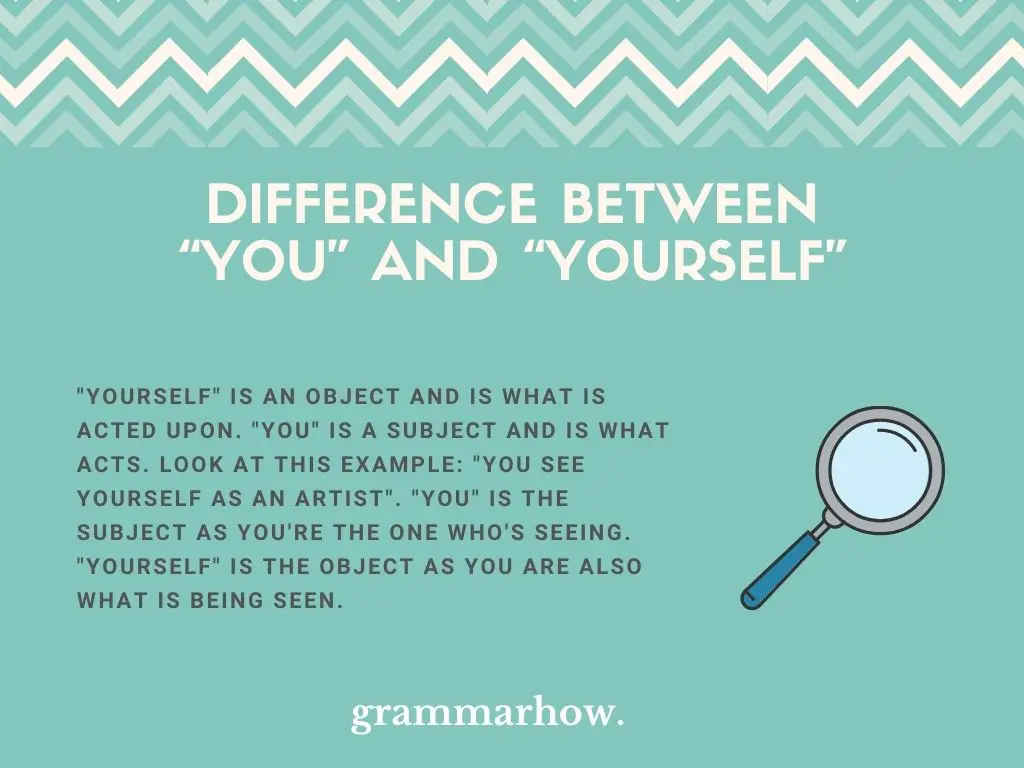What’s the difference between “you” and “yourself”?
What is The Difference Between “You” And “Yourself”?
“Yourself” is an object and is what is acted upon. “You” is a subject and is what acts. Look at this example: “You see yourself as an artist”. “You” is the subject as you’re the one who’s seeing. “Yourself” is the object as you are also what is being seen.

Subject (You) Vs Object (Yourself). What does that mean?
The word “object” is used a lot in our modern life. We might talk about the “objectification” of animals. Or you may have heard someone complain that “he treats women like objects”. But what does it mean to be an object?
An object is something that is acted upon. Like it or not, this happens to all of us. If I say “The driver gave me a ticket”, I am objectifying myself since the driver is the actor and I am the one being acted upon.
When talking about yourself, you would use “I” as a subject, but “me” as an object. Likewise, when you’re talking about the person you’re talking to, you use “You” as the subject, but “yourself” as the object.
The Subject (You) Is Sometimes Implied Rather Than Said
Although “you” is always the subject, it is sometimes implied rather than explicitly said. For example, if I say “get yourself a new car”.
“Yourself” is still the object as it is the thing that should get a new car. However, even though I don’t say it, what I imply is “you should/will get yourself a new car”.
The lack of an explicit subject does not mean that there cannot be an object. The subject can just be implied.
“You” Isn’t Always A Subject- It Can Also Be An Object
And now, just because I like being mean and making my lovely readers confused, I am going to throw a spanner in the works.
We’ve just said that “you” is the subject. However, when there is a different subject, “you” can also be an object.
“I really want to meet you”.
Here, “I” is the subject, because it is the thing that is doing the action of wanting to meet. And “you” is the object because it is the thing that “I” is doing the action of wanting to meet.
The rule of “you” being a subject does not apply when there is a different subject.
Examples Of You And Yourself
4 Examples Of You
- “Get yourself a gym membership, I know there is one just five minutes from your house, so there is no reason not to”
- “Find yourself a beautiful woman. She should be kind, sweet, caring, and nice to look at. Just make sure she doesn’t talk back to you”
- “Don’t do that to yourself. There is no need for that kind of self-destructive behaviour. Please just relax”.
- “Get yourself a new car. It should be fast, red, and able to use as little fuel as possible”
4 Examples Of Yourself
- “You live 5 minutes away from your nearest gym. So there is no reason why you shouldn’t get a gym membership within the next month”
- “You need a beautiful woman. She should be kind, sweet, caring, and nice to look at. Just make sure she doesn’t talk back to you”
- “You need to stop doing that. I know that things can be stressful, but there is no need for that kind of self-destructive behaviour. Please just relax”.
- “You need a car which is fast, red, and able to use as little fuel as possible”
Your Self Vs Yourself: Linguistics Vs Philosophy
Something to not is that a space can make a lot of difference. The word “yourself” is not just a different spelling of “your self”.
Whilst “yourself” is the object form of “you”, “your self” is a more philosophical term. It’s essentially saying “the self which belongs to you”.
The concept of “your self” is one that is debated among philosophers, and they don’t all agree about what it means, or even if it exists. But, “the self” is something inside of you, and has nothing to do with your physical body.
There are even some who argue that “the self” is another word for “the soul”. But, I’m here to teach you about English, not philosophy.
Conclusion
And there we have the difference between “you” and “yourself”.
The word “you” can be a subject, however, when there is already another subject in the sentence, “you” becomes the object.
However, “yourself” is always the object, even if the “you” is implied rather than said.

Martin holds a Master’s degree in Finance and International Business. He has six years of experience in professional communication with clients, executives, and colleagues. Furthermore, he has teaching experience from Aarhus University. Martin has been featured as an expert in communication and teaching on Forbes and Shopify. Read more about Martin here.
